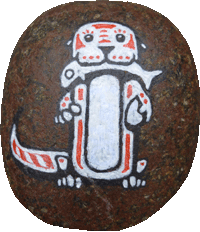31st January 2011
I would have been quite happy to hang around the house all day doing not much, but oh no we had to go and visit the clifftop temple of Ulu Watu with grandma. Also known as the monkey temple.
Actually, almost all temples in South-East Asia seem to be known as the monkey temple and in many places the monkeys are right pests, confident enough to grab food off of people if there’s any available. In South Africa there were similar problems with baboons in a few places, and some of those beasts weigh in heavier than a doberman.
The monkeys at Ulu Watu (long-tailed macaques if anyone cares to know) are another story altogether. I stopped to photograph one chewing on a flip-flop, wondering who had been careless enough to leave their footwear lying around for grabbing. Just as I looked up to see Maureen and grandma a few steps above me, a monkey leapt on Maureen’s head and had her brand new hat in a moment while another snatched the scrunchy from her hair.
When I rushed up to grab the hat, the villain leapt back from me and then jumped forward with a hiss and a snarl of canines. More alarmingly, three other nearby monkeys approached baring their teeth and hissing. Very tribal. I really wished I had a stick. Maureen and grandma had retreated further up the steps, and when I looked up again a monkey was making off with one of grandma’s flip-flops. Not a bad trick as she had been standing still watching me at the time.
Maureen bravely cornered it and snatched the flip-flop back, but had to use the footwear as a weapon because the wicked beast was mock-charging her with canines bared and every intent of getting its prize back.
I’m not sure how things would have turned out otherwise, but a couple of guys appeared who made the monkeys back off a little. When we explained what had happened, they offered to retrieve the hat for 20,000 rupiah (£1.30) and did so by throwing a snack to the monkey in the tree who dropped the hat in exchange. And therein lies a good part of the problem. It doesn’t take a genius to see that getting a reward for stolen goods is only going to reinforce the behaviour, when what is actually needed is some aversion to approaching humans. People are warned not to wear hats and sunglasses (by a quirk of where we parked we missed the warning) but if the monkeys have progressed to snatching shoes off feet then with that level of bravado they’re obviously going to find new mischief.
The monkey chewed the button off the top of our new hat, so there’s a jagged brass rivet visible on top now. I liked that hat. And I managed to find Maureen’s scrunchy once it was discarded, but that loyal hair-tie which has survived six months of travel has a rip in it and the elastic snapped.
Post-scriptum…
On the other hand, material items are mere ephemera and for all that she was terrified at the time I expect grandma may be telling people about her visit to Ulu Watu for a while to come. And while I was espousing big sticks and aversion therapy to Maureen, grandma also said something simple that offered a different perspective on monkey temple: “It’s their place.” If Ulu Watu is the territory of a tribe of long-tailed macaques, then when we enter there we must accept their behaviour and take whatever defensive steps are needed on our part. Labelling the monkeys wicked and planning how best to scare them off is the kind of human behaviour that has shoved most other species on this planet into the tiny protected areas of wilderness they survive in today.
Related Images:














































Hi! I lived in Indonesia for a few years, but didn’t visit the monkey temple, to my regret. I am right now writing a post about itching on my blog and would love to us your photo of the itching money. May I have your permission? I will give credit and link it back to your post.